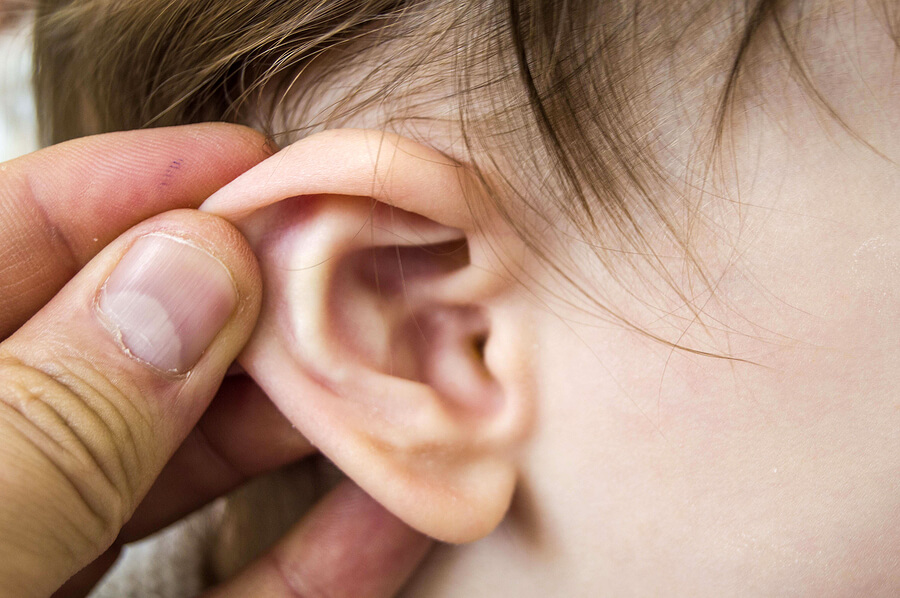At What Age Should a Child Speak Well?

A child should speak well from 2 years of age. Your baby learns to speak during the first two years of life. They’ll learn to use words to describe what they see, hear, feel, and think. They’ll do this gradually, as they progress in their mental and emotional development.
Thanks to research on the subject, we now know that a baby learns the rules of language and how adults use it to communicate long before they speak their first words.
The first thing your child will use to communicate will be their tongue, lips, palate, and any teeth that come out to make sounds. Shortly after, they’ll start to babble. Little by little, those sounds begin to turn into words. From this moment, your baby will learn more words and will begin to form sentences of two or three words.
How does speech develop?
Crying is your baby’s first exploration into the world of language. When they cry, they’re expressing how surprising it is to be in a new place that’s not at all like their mother’s womb. From then on, they’ll absorb sounds, tones, and words that will later shape the way they speak.

Speech is directly linked to hearing. By listening to others speak, your child learns how words sound and how sentences are structured. Many researchers believe that language comprehension begins in the womb.
Keep in mind that your baby becomes familiar with the sound of your voice, just as they once did with the beating of your heart. A few days after birth, they’re already able to distinguish your voice from those of others.
What should you do for your child to learn to speak well?
To help your child speak well, all you have to do is talk to your child. Be aware that the more you talk to them, the more you’ll be stimulating your baby to talk. Children who hear their parents talk a lot are more likely to develop speech sooner.
This also allows them to handle a richer vocabulary than other children who don’t receive the same stimulation. You can start talking to them during pregnancy so that your baby gets used to the sound of your voice. Read a book or sing to them, for example, when you’re in the shower.
Remember that your child will speak well only if you speak well to them. Don’t avoid complicated words. Although many times you simplify your way of speaking so that they understand what you say, the best way you have to expand their vocabulary for them to listen to you use new words.
When should you start worrying if your child doesn’t speak well?
If your baby doesn’t look at you when you talk to them or doesn’t make sounds, they may have hearing problems. When in doubt, consult your doctor, as early detection is essential in order to be able to offer the child the appropriate treatment that allows them to develop language in a timely manner.

There are some children who begin to form words around 9 months and others who do so as late as 13 or 14 months. If your child doesn’t say any words or you can’t understand a single word they’re saying and they’re already 15 months old, it’s best to see your pediatrician. They could have a condition that affects the development of their speech, such as autism or speech apraxia.
If at age 3, the child still doesn’t pronounce all the consonants or substitutes one sound or one syllable for another, your child may have a speech or hearing problem.
It’s normal for children to stutter or stammer when speaking from time to time. Sometimes, they have so much enthusiasm that the words don’t come out. In this situation, let your child finish the sentence and avoid intervening to help him. If you do, you may make them feel bad. Also, this attitude won’t help them learn.
Recommendations
If the stutter is permanent, it is recommended that you consult a hearing and speech specialist. It is easier for children to progress if they are treated in the first 6 months and up to a year, counted from the moment the stutter appeared, regardless of age.

If you have concerns about your child’s speech development, you can ask your doctor for a referral request. However, speech departments generally readily accept consultation requests from concerned parents.
Remember that each child learns at their own pace and has their own way of communicating. Language development is progressive: Once your child says their first word, little by little, they’ll enhance their ability to express themself verbally.
A child should speak well from 2 years of age. Your baby learns to speak during the first two years of life. They’ll learn to use words to describe what they see, hear, feel, and think. They’ll do this gradually, as they progress in their mental and emotional development.
Thanks to research on the subject, we now know that a baby learns the rules of language and how adults use it to communicate long before they speak their first words.
The first thing your child will use to communicate will be their tongue, lips, palate, and any teeth that come out to make sounds. Shortly after, they’ll start to babble. Little by little, those sounds begin to turn into words. From this moment, your baby will learn more words and will begin to form sentences of two or three words.
How does speech develop?
Crying is your baby’s first exploration into the world of language. When they cry, they’re expressing how surprising it is to be in a new place that’s not at all like their mother’s womb. From then on, they’ll absorb sounds, tones, and words that will later shape the way they speak.

Speech is directly linked to hearing. By listening to others speak, your child learns how words sound and how sentences are structured. Many researchers believe that language comprehension begins in the womb.
Keep in mind that your baby becomes familiar with the sound of your voice, just as they once did with the beating of your heart. A few days after birth, they’re already able to distinguish your voice from those of others.
What should you do for your child to learn to speak well?
To help your child speak well, all you have to do is talk to your child. Be aware that the more you talk to them, the more you’ll be stimulating your baby to talk. Children who hear their parents talk a lot are more likely to develop speech sooner.
This also allows them to handle a richer vocabulary than other children who don’t receive the same stimulation. You can start talking to them during pregnancy so that your baby gets used to the sound of your voice. Read a book or sing to them, for example, when you’re in the shower.
Remember that your child will speak well only if you speak well to them. Don’t avoid complicated words. Although many times you simplify your way of speaking so that they understand what you say, the best way you have to expand their vocabulary for them to listen to you use new words.
When should you start worrying if your child doesn’t speak well?
If your baby doesn’t look at you when you talk to them or doesn’t make sounds, they may have hearing problems. When in doubt, consult your doctor, as early detection is essential in order to be able to offer the child the appropriate treatment that allows them to develop language in a timely manner.

There are some children who begin to form words around 9 months and others who do so as late as 13 or 14 months. If your child doesn’t say any words or you can’t understand a single word they’re saying and they’re already 15 months old, it’s best to see your pediatrician. They could have a condition that affects the development of their speech, such as autism or speech apraxia.
If at age 3, the child still doesn’t pronounce all the consonants or substitutes one sound or one syllable for another, your child may have a speech or hearing problem.
It’s normal for children to stutter or stammer when speaking from time to time. Sometimes, they have so much enthusiasm that the words don’t come out. In this situation, let your child finish the sentence and avoid intervening to help him. If you do, you may make them feel bad. Also, this attitude won’t help them learn.
Recommendations
If the stutter is permanent, it is recommended that you consult a hearing and speech specialist. It is easier for children to progress if they are treated in the first 6 months and up to a year, counted from the moment the stutter appeared, regardless of age.

If you have concerns about your child’s speech development, you can ask your doctor for a referral request. However, speech departments generally readily accept consultation requests from concerned parents.
Remember that each child learns at their own pace and has their own way of communicating. Language development is progressive: Once your child says their first word, little by little, they’ll enhance their ability to express themself verbally.
All cited sources were thoroughly reviewed by our team to ensure their quality, reliability, currency, and validity. The bibliography of this article was considered reliable and of academic or scientific accuracy.
- Baddeley, A. (2007). Working Memory, Thought and Action. Oxford: Oxford UP.
- Brose, N. (2009). “Autismo”, Mente y Cerebro, 38: 36-41.
- Tordera Yllescas, J. C. (2007). “El trastorno de espectro autista: delimitación lingüística”, ELUA, 21: 301-314.
This text is provided for informational purposes only and does not replace consultation with a professional. If in doubt, consult your specialist.








